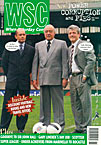 Along with many more, he was compared with the Busby Babes, but Tony Kinsella thinks that Andy Ritchie could have laid claim to being that good
Along with many more, he was compared with the Busby Babes, but Tony Kinsella thinks that Andy Ritchie could have laid claim to being that good
In the days before winning championships with kids became a formality, every new Wonderboy at Manchester United was viewed exclusively as a perspective on the bygone Busby era: Trevor Anderson was “the new George Best” because he resembled the maestro uncannily; Scott McGarvey “the new Denis Law”, fair-haired and Scottish; and Ashley Grimes was “the new Bobby Charlton” because… nope, can’t help you on that one.
But finally, a decade on from Benfica, along came a muscular whippet of a striker with two scorching feet, a delicious first touch, and a bonce of solid granite. Andy Ritchie was no hand-me-down shadow of better days. Here was every superlative we’d ever read about the legends of the past, rolled into one composite genius. Here was a rookie with a habit of hammering hat-tricks, who would stroll into the England team. Here (at last) was 30 goals in a season.
Yet by 1981, Ritchie had been offloaded to Brighton, departing en masse with the rest of United’s central strike-trio, Joe Jordan and Jimmy Greenhoff. In four frustrating campaigns, Ritchie notched an admirable average of a goal every two games, a somewhat superior rate to his cohorts. In retrospect, I guess Ritchie was in the right place at the wrong time. He possessed more skill than Jordan and cut a more daunting physical presence than Greenhoff, but fell short of both when it came to vice versa. Manager Dave Sexton, notorious for fielding sides greyer than a Mancunian sky, had the courage to blood a teenage goalkeeper, Gary Bailey, but got cold feet when dealing with the loose cannon that was Andy Ritchie.
Even when, a week before United’s 1979 FA Cup Semi-Final clash with Liverpool, Ritchie registered a deafening claim for a starting place with a belligerent hat-trick that demolished Spurs, Sexton dropped him and opted for the experienced Jordan. Big Joe’s crucial goal in the subsequent tie proved that Sexton wasn’t wrong, but not that he was necessarily right. Had Ritchie played, my conviction is that we wouldn’t have needed the fuss and nonsense of a replay.
And the Spurs game was no fluke. In the same season, Ritchie thrashed in volleys with either foot, punctuated with a bullet header, as Leeds succumbed to the same 4-1 scoreline as Tottenham. If David Beckham’s goals last season could’ve furnished a high quality Goal of the Season contest, Ritchie achieved the same portfolio in 180 minutes of football.
Ritchie’s departure from Old Trafford was not, of course, a headlong plummet into oblivion. After Brighton, he resumed cult status at Oldham Athletic, a sanctuary where players who never quite “made it” (Milligan, Holden, Bunn) pull together for one last tilt at the top. Personally, I felt curiously mixed emotions when Ritchie banged in an equalizer against United in 1990, in a fixture he deserved to play in 11 years earlier: an FA Cup Semi-Final. His efforts, though, were in vain, as Mark Robins coolly slotted the goal that took United to Wembley in the last minute of extra-time. You remember Robins: a young striker with the potential to score 30 goals in a season and stroll into the England team… no, wait, come back…
From WSC 129 November 1997. What was happening this month